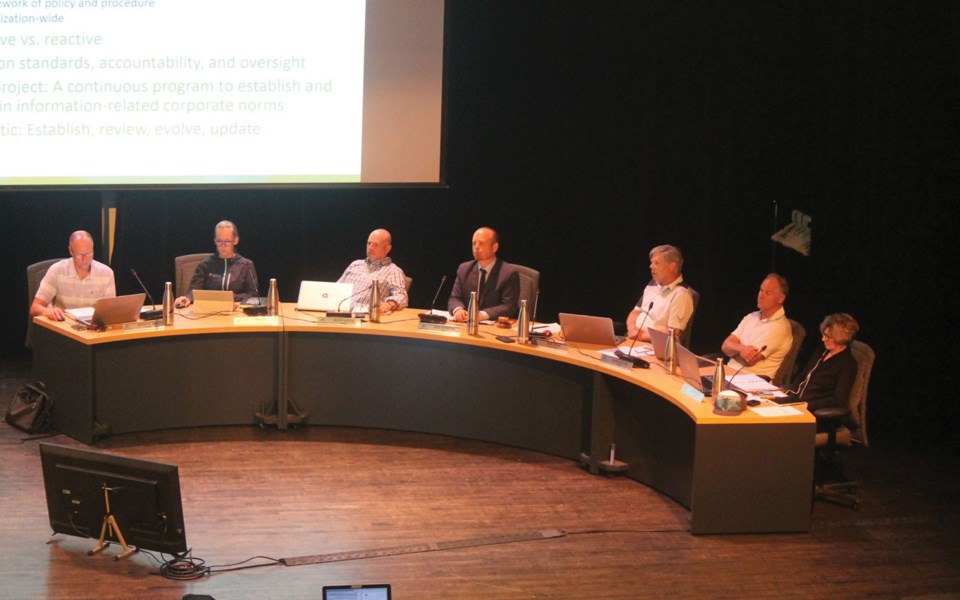Whistler's long-awaited updated Official Community (OCP) Bylaw is headed for adoption after receiving third reading at the July 23 council meeting.
The OCP bylaw has been amended slightly from the version last seen at a public hearing on April 16, to reflect the wide range of comments heard from the public.
In a presentation to council, director of planning Mike Kirkegaard detailed staff's response to some (though not all) of the comments heard.
The Resort Municipality of Whistler (RMOW) received 14 verbal and nine written submissions through the public hearing process covering a wide range of topics—everything from the readability of the document to a potential conflict of interest in regards to Councillors Arthur De Jong, Cathy Jewett and Ralph Forsyth, who are all employed by Vail Resorts.
On that last point, a legal opinion obtained by the RMOW concluded the three councillors have no conflict of interest with respect to adoption of the OCP.
"We really saw the breadth of the OCP covered in people's comments, so it was an interesting exercise in terms of the public engagement and the public input into testing the entire OCP and the policy within the OCP," Kirkegaard said in a presentation to council.
"We have reviewed those revisions [to the latest draft of the OCP] with our legal counsel, and with that legal review have determined that none of those revisions would invoke a need for a further public hearing."
The most recent version of the OCP (which includes tracked changes to show what's been modified since the public hearing) can be found in the July 23 council package starting on page 233: www.whistler.ca/municipal-gov/council/meeting-agendas-and-minutes.
In terms of next steps, the OCP bylaw will head back to the province for ministerial review (including consultation with the Lil'wat and Squamish Nations). The OCP's Regional Context Statement will also be referred to the board of the Squamish-Lillooet Regional District for approval.
If all goes according to plan, official adoption of the bylaw will take place later this year.
It's been a long and winding road for Whistler's OCP, which the RMOW first set out to update all the way back in 2010.
While the council of the day approved that update (after more than 2,000 hours of citizen and stakeholder engagement), a challenge from the local First Nations—which argued that the provincial government did not fulfil its consultation duty—eventually quashed the approved OCP update in 2014.
The RMOW reverted back to a 1993 version of the document, and officially restarted the OCP update process in late 2017.
Relationship building with the local First Nations was made a priority, and in April 2017, the RMOW signed a Memorandum of Understanding (MOU) between itself, the Squamish and Lil'wat First Nations, Whistler Blackcomb and the provincial government, which it said represented a "commitment to collaboration" amongst the parties.
The MOU (which is not legally binding) included a list of "key interests" for the parties to explore: transfer of the Kadenwood Lands to the First Nations in exchange for the Emerald Lands; appropriate development opportunities at Kadenwood, South Base or other suitable locations in the Controlled Recreation Area (CRA); an approach to the value of the options lands required for the South Base opportunities, or other suitable locations in the CRA; a long-term property tax exemption for the Squamish-Lil'wat Cultural Centre; development of a management planning process with respect to Crown Lands in RMOW boundaries; First Nations' support of a new OCP for the RMOW; and consideration from the Ministry of Community, Sport and Cultural Development to remove the requirement for ministerial approval of future OCPs, or amendments to them (a provincial bill which does exactly that was given royal assent on March 25).
While revenue sharing agreements between Whistler Blackcomb and local First Nations under the mountain operator's Master Development Agreements (signed between WB and the province with First Nations support in 2017) are confidential, a separate agreement signed between the province and First Nations in 2017 sees the province provide 37.5 per cent of the incremental revenue it gets from WB to the Nations.
The incremental revenue varies year to year depending on several factors, including visitation and value of the Canadian dollar.
Following more public consultation that built on work undertaken in 2010, the updated OCP bylaw received first reading in October 2018, followed by second reading in March 2019.
STRATEGIC PLANNING COMMITTEE GETS FIRST APPOINTMENTS
Despite all the effort it has taken to get to this point, in many ways, the real work is only beginning once council adopts the OCP.
To help realize the long-term goals of the planning document, the RMOW launched a new Strategic Planning Committee in April.
The committee will act in an advisory capacity to support council in its decision making, with three primary goals: providing input on long-term development, providing strategic input for potential amendments to the Official Community Plan, and to establish guiding metrics and targets to help support, manage and balance Whistler's resort and community capacity, while still protecting its unique sense of place and meeting the community's longer-term needs.
On July 23, the committee's five members-at-large were announced: Emily Amirault, Dave Brownlie, David Dale-Johnson, Dave Williamson and Robyn Spencer.
Along with the five members-at-large, the SPC will be comprised of Mayor Jack Crompton (who will serve as chair), Councillors Duane Jackson and Arthur De Jong and the RMOW's Chief Administrative Officer, general manager of resort experience and director of planning, as well as two non-voting staff representatives from the economic development department.
"I would say that 34 applications and an absolutely incredible group of people putting up their names to help us make decisions in our community was encouraging," Crompton said.
"I hope and intend that we can get this group together to share the thoughts that they have with us, whether they were appointed to the committee or not, because I think taking on that input will be incredibly valuable for our community."




